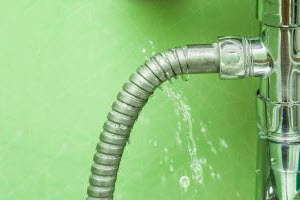
According to Chubb claims data, water damage is the number one source of property damage of non-weather-related losses to Chubb homeowner clients. That’s why installing a smart flow-based water shut off device, designed to detect even small leaks, alert you and shut off your water before major water damage can occur, helps give you greater peace of mind. Water shut off devices are monitored and controlled by an app on your phone and/or a panel in your home. They are designed to alert you and shut the water off when a critical leak is detected. If a leak is detected and your water shuts off, what should you do next? Below are recommended steps if your water shut off device activates.
If the water has been shut off by your device, you should first go room by room looking for signs of water on the floors, walls, and ceiling. Start with the top culprits in your home - the rooms with the most water supply lines. This would be the kitchen, bathrooms, laundry room and water heater closet (be sure to look inside cabinets under sinks or appliances that use water). If you don’t see anything obvious, turn the water back on (from the app or panel) and systematically go back through the house looking and listening for signs of leaking water. If you don’t find the leak inside, the leak could be outside. When outside, check items such as your water treatment system, faucets, and outdoor showers. If your device is monitoring your irrigation system, check for broken sprinkler heads.
Some common causes of the shut off device activating include: a toilet flapper not sealing properly, shower or faucet fixture dripping, filling your swimming pool or hot tub, workers using the water, or in my case, your cat turned on the faucet to get a drink and didn’t turn it off.
If you find the water culprit, and it is a broken fixture or plumbing line, you have successfully saved yourself from a potentially major water damage loss and the resulting headache! After a major water loss, you could be out of your home while it is being repaired for five to six months, or even longer.
If you still can’t find the problem, keep searching. Most devices have the option to run a health check from your smart phone. This will provide additional clues and information. The alert may be because your new water shut off device is in the “learning phase.” You can also call your device’s customer support or live chat on their website to trouble shoot. If you still can’t find the cause, call your trusted plumber to help locate the source of the leak as it may be hidden in the walls or slab.
Many people are concerned that the device will shut off while taking a shower and when the dishwasher is running. These are considered “non-critical” alerts and your device will react accordingly. The water will shut off only if there is a continuous flow outside of your normal water usage. A normal timeframe setting is 30 minutes, but you can set your own timeframe before activation and set it for “Away” mode when you are on vacation so it will shut off much quicker.
But please, whatever you do, don’t ignore the alerts; don’t mute them, and don’t turn the device off. These alerts are to notify you that there is a potential leak somewhere in your plumbing system. Although it may require some investigation to find the leak, it could save you from significant water damage in your home.
Jill Crawford is a Level I Infrared Thermographer and Senior Risk Solutions Consultant at Chubb Personal Risk Services.
The opinions and positions expressed are the authors’ own and not those of Chubb. The information and/ or data provided herein is for informational purposes only and is not a substitute for professional advice. Insurance coverage is subject to the language of the policies as issued.